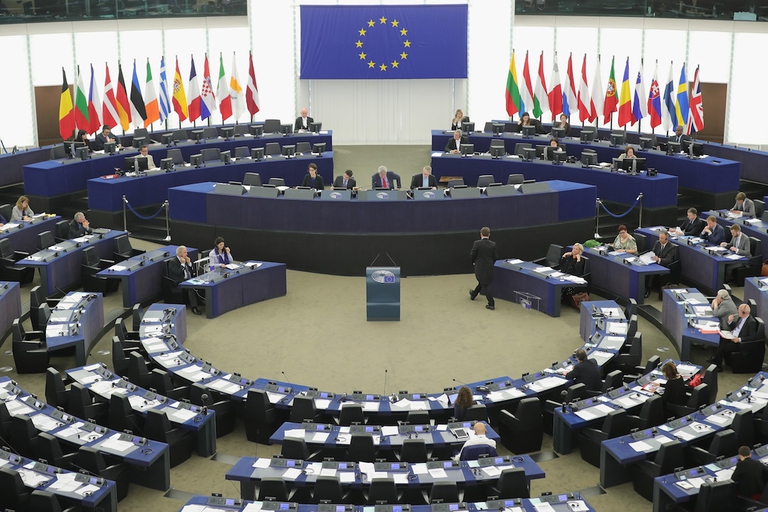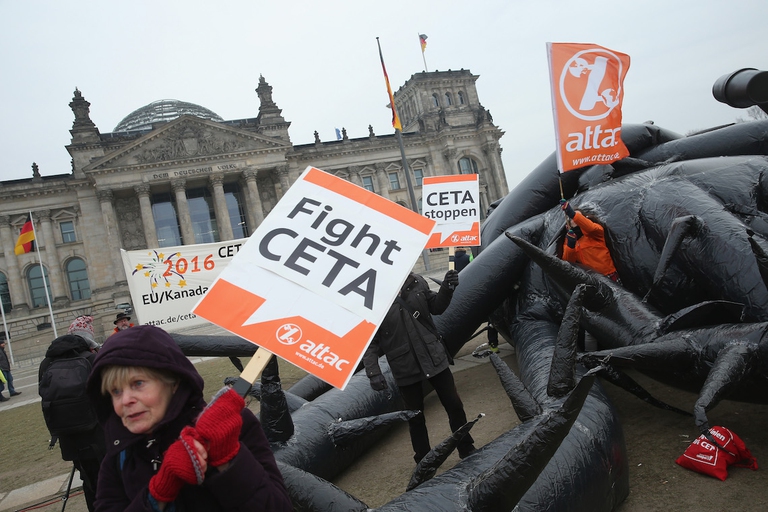
As per tradition after 12 years India held Mahakumbh, the world’s largest spiritual congregation that has been attracting pilgrims from across the globe.
L’assemblea parlamentare europea ha approvato il trattato Ceta tra Unione europea e Canada. Ora la battaglia si sposta sul piano nazionale.
The European Parliament passed the controversial Comprehensive Economic and Trade Agreement (CETA) aimed at creating a free trade area between the European Union and Canada. After overcoming the obstacle of Wallonia (its local Parliament was halting Belgium’s approval) the deal was approved by the Members of the European Parliament (MEPs) in a 408-254 vote on 15 February 2017.
A large part of the agreement will be provisionally applied, waiting for the ratifications of each member state. The battle brought about by activists opposing the deal – who demonstrated in front of the European Parliament during the vote – will thus continue on a national level.
To fully enter into force the deal has to be approved by the 38 national and regional Parliaments in the EU, including Wallonia, and by the Canadian Parliament. French President Emmanuel Macron, a liberal and the only candidate to back the deal during France’s electoral campaign, said on 1 May that an additional analysis of CETA could be possibly carried out by a team of experts before the ratification. In this sense, the process could take some time and this is precisely why part of the deal provisionally entered into force in April 2017. 95 per cent of the treaty is, in fact, already operational thanks to CETA Article No. 30.7 that allows its implementation one month after the approval.
Officially, the agreement aims to favour the trade between the two economic areas. The 2,256-page document stipulates a radical reduction of custom duties and a regulatory convergence between the EU and Canada. For example, a company will be allowed to carry out a single test on its products and still commercialise them in both areas. The treaty, however, excludes some sensitive products like genetically modified organisms (GMOs).
This should theoretically allow Canada to increase tenfold its exports of meat towards Europe, and the EU to significantly increase the sales of cheese overseas. CETA also aims to open up Canadian public markets to European companies to 30 per cent (up from the current 10 per cent), while the opening of European markets is already 90 per cent. In the end, the agreement aims to build an arbitration court named Investment Court System (ICS) that judges potential controversies.
In the Parliament CETA is mainly backed by the right-wing. Manfred Weber, German member of the European People’s Party (EPP), said that the deal represents a model for the future, based on cooperation and common values. On the contrary, Greens, the left-wing and part of the socialist and democratic group firmly oppose it: “The agreement implies too many uncertainties and risks,” said French socialist Emmanuel Maurel.
According to the critics, the deal would threaten local agriculture, as well as workers’ rights, the health system and the regulations related to consumers and the environment. Also, arbitrations could be over the legislative power of local Parliaments. To give its consent, in fact, Wallonia imposed important changes, including one amendment to submit all commercial disputes to an entirely public jurisdiction. In addition, an assessment of the social and economic impacts of the preliminary application of CETA will be carried out regularly. And the Court of Justice of the European Union will judge the compatibility with the communitarian regulations of the court in charge of resolving disputes between multinationals and States.
These improvements aren’t enough in associations’ eyes. “The European Parliament is on the wrong side,” commented Federica Ferrario of Greenpeace Italia. “In spite of its approval, the ratification of CETA by all national and regional Parliaments is rather unlikely. European politicians, in particular those who define themselves progressive, should favour public interest and justice over multinationals”.
“With 3.5 million signatures and tens of thousands of questions to MEPs, European citizens made it very clear that they reject CETA on many grounds. In a year with so many important elections across Europe, it is especially hard to assume that MEPs can ignore their electorate’s voice,” said Amélie Canonne, spokesperson of the Stop TTIP alliance.
Siamo anche su WhatsApp. Segui il canale ufficiale LifeGate per restare aggiornata, aggiornato sulle ultime notizie e sulle nostre attività.
![]()
Quest'opera è distribuita con Licenza Creative Commons Attribuzione - Non commerciale - Non opere derivate 4.0 Internazionale.
As per tradition after 12 years India held Mahakumbh, the world’s largest spiritual congregation that has been attracting pilgrims from across the globe.
Workers in tea gardens of West Bengal, India, that produces Ctc tea for domestic consumption complain that they have been devoid of basic facilities while political parties make hollow promises during every elections which are never fulfilled.
India is in the middle of the elections, but sadly none of the politicians have uttered a word on man-animal conflict that has been devouring several lives every year.
Manipur, a state in north-east India, is still reeling under the tremors of violence that broke out last year devouring lives and paralyzing the economy.
The government of Tanzania is currently planning to evict more than 80.000 indigenous Maasai people from their ancenstral land
A new UNU-INWEH report on the global bottled water industry reveals the massive scale of this market and the lack of strict quality controls.
Isatou Ceesay founded a social enterprise that is helping to fight plastic pollution and empowering women and young people to gain economic independence.
In 2020, Mihela Hladin made a radical decision that many, in recent times, have probably considered. This is her story, with photos by Matt Audiffret.
The Brazilian government has started evicting illegal gold miners, responsible for the health emergency that has hit the Yanomami people.









